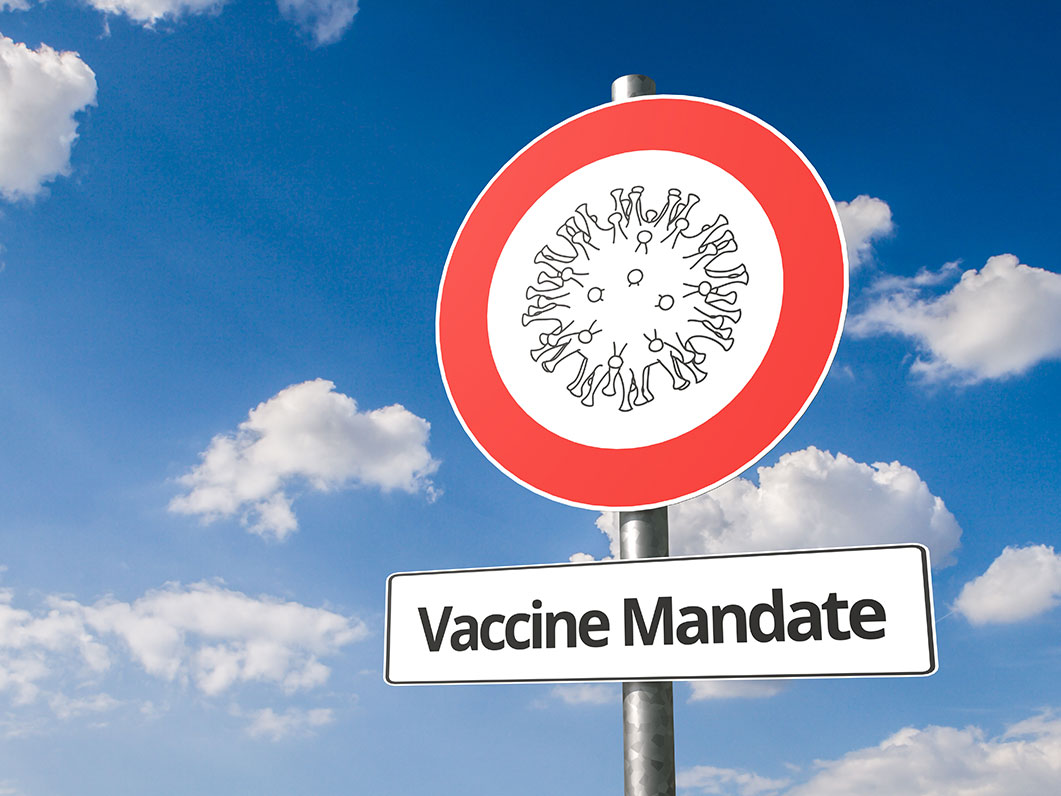The number of truckers participating in the Vancouver-to-Ottawa march varies depending on the news source, but one thing is for sure: the protest that started on Sunday, Jan. 23, has generated interest and prompted at least one Canadian official to reach out to his U.S. counterparts in an effort to end the vaccine mandate.
A Bloomberg story on Jan. 24 posted at https://finance.yahoo.com/news/alberta-kenney-talks-governors-ending-201201290.html said that Alberta Premier Jason Kenney “said he’s working with U.S. governors to lobby President Joe Biden and Canadian Prime Minister Justin Trudeau for an end to trucker vaccine mandates that are disrupting shipments across the border.”
The story went on to say that the Conservative politician in “Canada’s largest oil-producing province said the group is preparing a letter to Biden and Trudeau. The letter, according to Bloomberg, urges the two leaders “to use common sense, and end the policy that has taken thousands of trucks off the road.” That quote was part of a Twitter post that had shown empty grocery stores shelves. The letter also said, “This is turning into a crisis. It requires immediate action by the Canadian and U.S. governments.”
The Bloomberg piece also stated, “The vaccination mandates have caused chaos for Canada’s fruit and vegetable markets and threaten to trigger similar headaches in the U.S. at a time when supply chains are already struggling with labor shortages and higher costs. The disruptions risk making food more expensive and scarce, adding to inflation worries that have stressed consumers and policymakers,” and it also added, “Only about half of U.S. truckers are vaccinated, according to estimates from the American Trucking Associations. While closer to 85 percent of Canadian truckers have received the shot, industry groups say the rules will still remove as many as 16,000 drivers off the road.”
An earlier story posted Jan. 23 by The Hill at https://thehill.com/policy/transportation/591001-canadian-truck-drivers-protest-covid-vaccine-mandate
said the truckers had raised more than $2 million by Sunday through a GoFundMe to fight the vaccine mandate’s requirements. The Hill story cited a Reuters post which said the drivers claimed the mandate will lead to drover shortages and contribute to inflation.
The story said, “The money raised will be used to provide fuel, food, and lodging for the marchers, who are expected to reach Ottawa on Jan. 29, the news service added.”
It continued, “Up to 20 percent of the 160,000 Canadian and American cross-border truck drivers could be impacted and off the roads as a result of the mandate, the Canadian Trucking Alliance (CTA) said, per Reuters.”
It went on to say, “Earlier this month, Canada said it would permit unvaccinated Canadian truck drivers to enter from the U.S., a reversal from a previous mandate for all truckers. Under that policy, American truck drivers were still required to be vaccinated.
“At that time, Prime Minister Justin Trudeau was reportedly facing mounting pressure from the opposition party and the trucking lobby to forgo the requirement.
“However, the mandate that the marchers are protesting went into effect on Jan. 15 and requires unvaccinated Canadian truck drivers to get tested for COVID-19 and to quarantine upon re-entering Canada from the U.S.”
Bloomberg also addressed the issue in a Jan. 19 post, saying that fresh produce outages in Canada have worsened with trucker shortages. The full story can be read at https://www.bloomberg.com/news/articles/2022-01-19/fruit-and-veggie-outages-in-canada-get-worse-with-trucker-shortages
It said, “Canadian border agents began refusing entry to unvaccinated American truckers just days ago, and it’s already causing chaos — particularly in fruit and vegetable markets.
“A mandate that started Jan. 15 requires truck drivers crossing into Canada to be vaccinated. However, only about half of American truck drivers have gotten their shots. Meanwhile, as much as 90 percent of Canada’s fruits and vegetables comes from the U.S. during winter, and grocery stores are already having trouble getting some shipments, according to the Canadian Federation of Independent Grocers.”
The story quoted Gary Sands, senior vice president of the Canadian Federation of Independent Grocers, who said, “We’re seeing shortages. We’re hearing from members they’re going into some stores where there’s no oranges or bananas.’”
And the story said, “The mandate is adding to Canada’s supply chain turmoil that was already abundant due to recent storms as well as the pandemic. Shipping snarls and logistical headwinds have been blamed for rising inflation across the globe. Prices for consumers will likely rise as freight costs soar. Sending one truckload of fresh produce from California or Arizona to Canada is now $9,500, up from an average of $7,000, according to North American Produce Buyers. That works out to an additional cost of 12 Canadian cents per head of lettuce, according to the company.
“The price to bring food and other exports over the border has doubled on some routes given the drop in eligible truckers, according to Alex Crane, operations manager at Paige Logistics, a freight broker in Surrey, British Columbia. That’s leaving hundreds of shipments bound for the U.S. waiting in warehouses to be picked up and trucked when and if carriers can find drivers to haul them, he said. The goods include everything from food to plumbing parts to gazebos.”
It continued, “`We have shipments all over the place not going out,’ Crane said by phone.” He added, “They are just sitting at warehouses, waiting.”
And, Bloomberg warned, “The situation is only set to worsen with the U.S. imposing its own vaccine mandate on foreign travelers starting Jan. 22. The Canadian Trucking Association estimates the mandate will take as many as 16,000 drivers off the road.
“The lack of truckers could potentially create ‘more of a shortage than what we’re experiencing now,’ said Victor Smith, chief executive officer of JV Smith Companies, a grower and distributor of leafy greens. That’s because trucking is the only option for transportation. Rail service isn’t available everywhere, and shipping by air is too expensive.”


